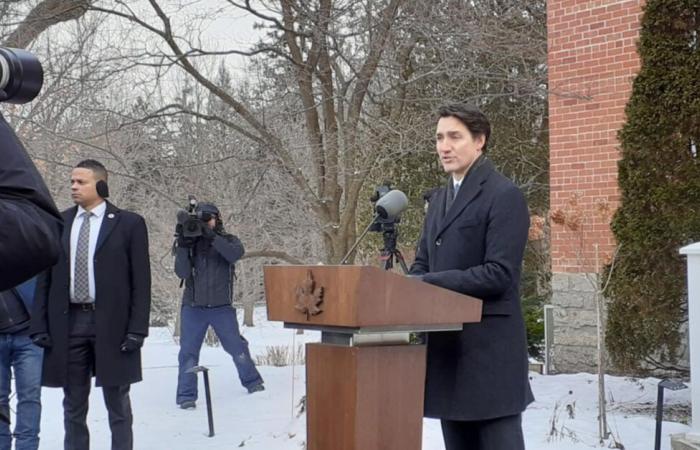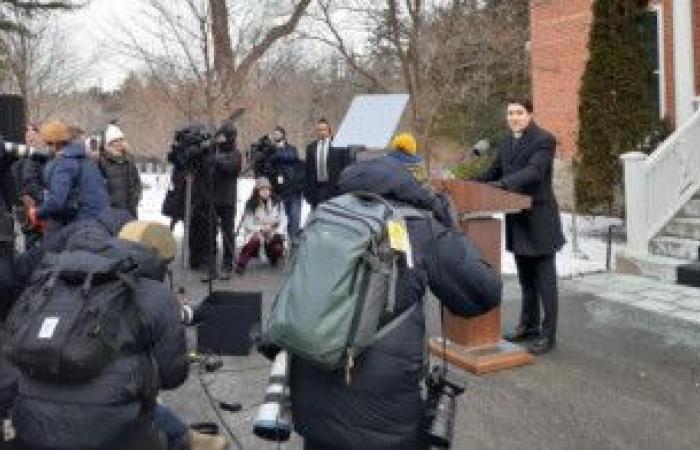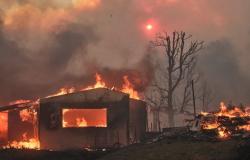With information from Julien Cayouette
It was in the freezing cold, in front of his official residence at Rideau Cottage, in Ottawa, that the Prime Minister surrendered with emotion on Monday, January 6.
“Last night I asked the party chairman to begin the necessary steps. The country deserves a clear and real choice,” said Justin Trudeau.
“I am not someone who backs down easily from a fight, especially a fight that is so important for the party and for the country,” he declared from the outset. I do this job because the interests of Canadians and the well-being of our country and our democracy are important to me. And it became clear that I cannot be the leader in the next elections, because of the internal battles [du Parti libéral].»
This resignation does not lead to a general election, only a race for leadership of the Liberal Party.
Also read: Colline soap opera: political crisis, deficit and services in French
What is proroguing Parliament?
Generally requested by the Prime Minister from the Governor General, this process marks the end of the work of Parliament.
All bills that do not receive royal assent are canceled and “die on the Order Paper.” They should be represented during the next legislature and their study would start from the beginning.
Parliamentary committees also end their work. Some can continue their work by adopting a motion and only under certain conditions.
Professor Boily believes that elections will quickly follow the prorogation of Parliament, after March 24.
Photo: Courtesy
Next steps
After March 24, Parliament will resume its activities, with a new person at the head of the liberal party. “There should be the presentation of a speech from the throne to initiate a new legislature and the presentation of a budget,” comments in an interview with Francopresse Frédéric Boily, professor of political science at the St-Jean Campus of the University of Alberta.
“It remains to be seen how things will pan out. It is at the time of the throne speech and the budget that things will be decided,” foresees the political scientist.
The voices of Liberal MPs calling for the resignation of their leader have been growing in number since la sortie de Ken McDonaldMP for Avalon, Newfoundland and Labrador, about a year ago. Several were added during the holiday break.
Also read: Is Justin Trudeau listening to his MPs? (Chronic)
“Parliament needs a reset”
At a press conference, Justin Trudeau defended his decision by saying that it did not give Parliament the opportunity to vote on a motion of censure, which could be perceived as undemocratic.
Asked about his regrets, the Prime Minister returned to his decision not to adopt preferential voting for the elections: “The parties would have spent more time looking at the points they had in common to be the second or third choices of the voters [sic] rather than seeing the polarization we had. But I could not, unilaterally, change our voting method in this country.
Faced with concerns about Donald Trump’s tariff threats, he affirmed that the race for leadership of the Liberal Party would not prevent the government still in power from “protecting Canadians and their interests in a very complex world.”
Also read: Canadian minorities and the election of Donald Trump
The media gathered in front of the Prime Minister’s residence on January 6, 2025.
Photo : Inès Lombardo – Francopresse
“It doesn’t change anything”
The leader of the Conservative Party of Canada (PCC), Pierre Poilievre, opened the pre-election period with a press release entitled “It changes nothing”.
The latter presents a choice between liberals “often supported by the Bloc”, or “common sense conservatives, to lower taxes, build housing, repair the budget and stop crimes”.
Same exercise for the New Democratic Party (NDP). Its leader, Jagmeet Singh, called on Canadians to vote for him.
“The Liberals do not deserve another chance, whoever their leader is. […] I ask everyone who shares these values to join us. Together, we will stop the Conservatives and build the very first Canadian government for workers,” he declared in a press release.
Pre-election period
At a press conference, a few minutes after Justin Trudeau’s announcement, the leader of the Bloc Québécois, Yves-François Blanchet, admitted that he had no other choice but to give the Liberal Party time to run its course. to the chiefdom.
“But his or her successor will have to call elections as soon as they take office,” he added.
The Bloc leader wants an election to be called very quickly after March 24. He will treat the next two months as a pre-election period.
Yves-François Blanchet also expressed concern about the threats from American President-elect Donald Trump. “There is the danger that the Canadian government will be passive and very ineffective in the coming weeks.”
“What we can blame Justin Trudeau for is not having foreseen the situation and believing until the last moments of December that he could relaunch his government. This is where we must be critical of Mr. Trudeau,” asserts Frédéric Boily.
“A leader truly concerned about his party would have left in June,” he concludes.







